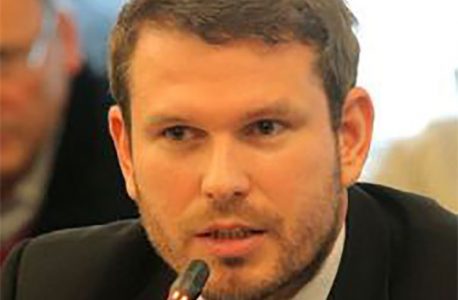By Andrej Nosko for the Visegrad Post
“It’s a simple reality: people working in the media are in the vast majority left-liberal. This is due to what we could call ‘selection bias’” said Andrej Nosko – who was until 2018 one of the directors and head of division for the Open Society Foundations funded by George Soros and who as such is well-acquainted, from within, with the practices of politics, the international press and NGOs (non-governmental organisations) significantly distorting reality – describing the present situation of the international press.
The person conducting the Skype interview with Mr Nosko whom we were unable to identify asked: Does this kind of bias in the media – meaning that Hungary or Romania receives different degrees of attention, for instance – come from the parties themselves?
According to the former director of the Soros Foundations, the answer to this question is clearly ‘yes’. “This is normal tribal or herd behaviour. They all come from the same group, and won’t criticise their own,” Mr Nosko said.
He took the view that if the Hungarian prime minister were a socialist, both the media and the European Union would treat him differently.
He mentioned as an example the premiership and approval rating of Slovakia’s Robert Fico, adding that investigative journalist Ján Kuciak was assassinated during his premiership. “Fico did far worse things than the Hungarian prime minister,” he observed. Mr Nosko also spoke about the time when a Slovak politician criticised the Hungarian media legislation. “I was entertained – perverse entertainment, I’m sorry to say that – when media freedom was criticised by an MP of Slovakia Monika Benová who is there for the socialist party and who voted for laws there were significantly more restrictive in Slovakia. She has the audacity to criticise a media law that was not half as restrictive as the media law that her party at home in Slovakia (voted for),” the former head of the Soros Foundations stated.
Mr Nosko mentioned as his favourite example that “Slovakia’s Robert Fico and Romania’s Victor Ponta were the socialists who were the loudest critics of Viktor Orbán, but when they would have had good reason to criticise their own, they remained silent”.
This leads us to the most interesting part of the Skype interview as Mr Nosko also spoke about Freedom House, the human rights research institute known well in Hungary. We should quote him verbatim on this: “When reading like ‘nations in transit’ of Freedom House, their work for the Slovak chapter, and sometimes it’s so irritating to see that instead of the analysis you have essentially agitprop, you know. Essentially, whenever it’s your friends who are in the government, then the country is doing well. If it’s not your friends in the government, then whatever they do is just not good enough,” Mr Nosko said.
The interviewer asked whether this could mean that Freedom House’s reports are incorrect. All Mr Nosko said in response to this suggestion is that “if a problem of this kind emerges in one chapter, then problems of this nature could also emerge in the others”.
It is public knowledge that a few days ago the Hungarian daily newspaper Magyar Nemzet quoted several extracts from the interview in question. In these, Mr Nosko stated, among others, that the reports of the international media about Hungary and Poland are distorted, biased and superficial. According to Mr Nosko, the reason for this is that today far fewer foreign correspondents work for the dominant media outlets than before, and journalists are usually required to cover the affairs of multiple countries. In his view, this leads to intellectual laziness in the mainstream media as well, and this, too, has played a central role in the development of the phenomenon described.
“As a result, it is very easy to criticise Poland and Hungary without citing actual arguments; in other words, these reports are biased,” Mr Nosko stated. He mentioned as an example that when he worked for George Soros’s foundations, foreign journalists who contacted them were regularly referred by staff members with an angle of their own to colleagues whose convictions were similar to their own. On a number of occasions, Mr Nosko himself hired journalists to promote the materials of awarded think tanks. “So we could say that the playing field wasn’t exactly level,” the former director admitted.
The other day, our newspaper published extracts from another Skype interview that is also part of the bulky folder of documents that was sent to our editorial office by e-mail.
In these recordings, Mátyás Kálmán, a former contributor of the news portals 24.hu and Index said various NGOs manipulate or even bribe journalists reporting about Hungary who then often cover the stories that happen in Hungary in a rather distorted light.
“There is no way of knowing whether (the given journalist) received an invitation to a fine hotel and how much he or she was offered to write the story that they want to hear told in the media,” Mr Kálmán said. In his opinion, it is not healthy that members of the press are dependent on NGOs to such an extent, and he took the view that under the circumstances it is difficult to provide transparent reporting. He mentioned Amnesty International, a human rights organisation sponsored by George Soros as one of the NGOs that seek to control journalists.

